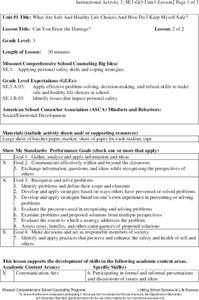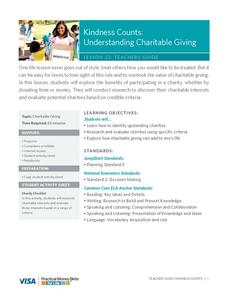Curriculum Corner
Guest Teacher Plans: 1st Grade
Have you ever gone to work when you needed to stay home but didn't because the thought of making substitute plans was too daunting? Don't feel that way anymore with a template designed for first grade equipped with general classroom...
Curriculum Corner
Guest Teacher Plans: Grade 6
Taking a day off of school can feel like a lot more work than going because of the time and effort that goes into making sub plans. Make your life easier with a daily plan for a guest teacher designed to meet the needs of sixth graders...
Curriculum Corner
Guest Teacher Plans (Grade 2)
Be prepared the next time you're in need of a substitute with a daily plan equipped with an assortment of activities covering subjects math, reading, word work, writing, and science.
Curated OER
Using Random Sampling to Draw Inferences
Emerging statisticians develop the ability to make inferences from sample data while also working on proportional relationships in general. Here, young learners examine samples for bias, and then use random samples to make inferences...
Curated OER
Making Predictions
Fourth graders explore making predictions while reading. They practice making predictions about stories they will read. Students discuss predictions and some of the details of a story. They write down their predictions and compare them...
Curated OER
Sonnet Explication
Students analyze close readings of poems, looking up words in the dictionary, and discussing the major parts of dictionary definitions, including word origin and parts of speech. They examine sonnets, then compare/contrast their findings.
Curated OER
Justice Is Blind, Colorblind That Is
It's so interesting to see kids respond to articles about education. To start the day, prompt learners to discuss the words colorblindness and diversity. Then, split your class in two and have one side read an article from 2007 and the...
Missouri Department of Elementary
Can You Erase the Damage?
A pencil and an eraser bring forth the message that negative comments never truly disappear. On a large piece of paper, scholars list negative comments then attempt to replace them with kind ones. Pupils discuss the impact of negative...
Media Smarts
Teaching TV: Critically Evaluating TV
Mercer Mayer's There's a Nightmare in my Closet creates the framework for a specific discussion of nightmares generated by TV and a more general discussion of other emotions evoked by programs.
University of the Desert
Do Journalists Shape or Report the News?
Analyze the presence of negative stereotypes and biased reporting in news media, and how this affects one's understanding of other cultures. Learners read newspaper excerpts and quotes from famous personalities to discuss the power of...
Curated OER
Learning About Phrases To Improve Fluency And Comprehension
Investigate the concept of phrases and how they are a crucial element for successful reading comprehension. High schoolers identify key phrases in reading selections. Afterward, they engage in writing exercises regarding what they have...
National Center for Case Study Teaching in Science
A Case Study Involving Influenza and the Influenza Vaccine
Using a hypothetical discussion between two coworkers broken up into four parts, budding biologists examine the flu shot and some of the typical arguments for and against it. The conversational nature of the reading makes it engaging and...
National Institute on Drug Abuse
The Brain's Response to Drugs
Marijuana affects the brain differently than inhalants, which have a different effect than opioids. Elementary and middle school classes read about these drugs as well as nicotine, methamphetamine, hallucinogens, and steroids before...
Anti-Defamation League
Mo’Ne Davis and Gender Stereotypes
A thoughtful discussion begins a activity about sports and gender stereotypes. After defining stereotypes, scholars highlight how gender stereotypes often have adverse effects. To break through those stereotypes, the class gets to know...
Curated OER
Reading and Writing About the Solar System
Utilizing the classic Magic School Bus series, young scientists explore the solar system. Some excellent worksheets are included in this plan, such as Planet Roll Call and Solar System in Motion. This is an ambitious 5-day unit that...
Curated OER
Making Prehistory
Students create mock fossil records based on current scientific theories about prehistory. By learning about what fossil records teach us about different prehistoric time periods, students gain a greater understanding of theories of...
Curated OER
Yo! Gert-making yogurt
Young scientists or chefs culture yeast to produce yogurt. The materials and a general description of how make yogurt are provided, but there is very little detail otherwise. You could use this as an activity when your biology class is...
Curated OER
Come Fly with Me . . . Open a Book: Travels through Literature
This detailed overview of a curriculum unit suggests using travel literature to engage and stimulate your third graders’ interest in reading. The suggested reading list includes fiction and non-fiction materials and offers urban children...
Crafting Freedom
Harriet Jabocs and Elizabeth Keckly: The Material and Emotional Realities of Childhood in Slavery
Learning how to make accurate inferences by putting together facts found in multiple sources is one of those skills all learners must develop, but one that can be a challenge to teach. This resource is a must-have for your curriculum...
Smithsonian Institution
A Ticket to Philly—In 1769: Thinking about Cities, Then and Now
While cities had only a small fraction of the population in colonial America, they played a significant role in pre-revolutionary years, and this was certainly true for the largest city in the North American colonies: Philadelphia. Your...
Smithsonian Institution
Who's in Camp?
Pupils complete readings, a group activity using cards, and a writing activity to better understand people's lives during the American Revolution. The resource emphasizes people such as the militiamen, women, officers, and children,...
Visa
Kindness Counts: Understanding Charitable Giving
Financial literacy is generally focused on personal spending and saving, but consider an opportunity to talk to your pupils about how charitable giving can also factor into money management and how it can enhance life for both oneself...
Heritage Foundation
The House of Representatives
The House of Representatives has a lot of responsibility in the United States government. But how did it all begin, and why is it the way it is now? A comprehensive lesson answers all of these questions about the US Constitution and...
Curated OER
Lesson Learned: Creating a Life Reports Project
Tap into the wisdom and knowledge of older members of the community with this New York Times plan. To warm up, learners write about and discuss advice they have been given. After reading "The Life Report," an op-ed column that asks older...

























